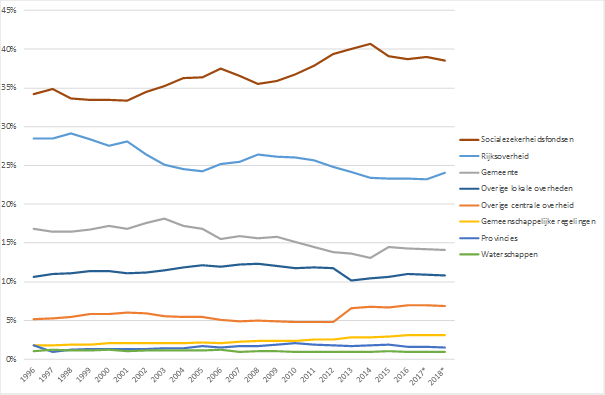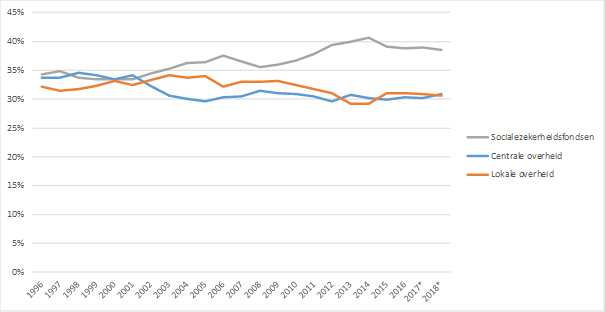Meer taken naar lokale overheid, maar aandeel in totale uitgaven stijgt niet

Uit nieuwe cijfers blijkt dat de Nederlandse overheidsuitgaven, ondanks decennia van decentralisatiebeleid, sinds 1996 niet minder centraal zijn geworden. Dit onderzoek van prof.dr. Maarten Allers en prof.dr. Klaartje Peters verschijnt op donderdag 25 juli in het vakblad Economisch Statistische Berichten (ESB).
Maarten Allers is hoogleraar Economie van decentrale overheden aan de Rijksuniversiteit Groningen (RUG) en directeur van het aan de RUG verbonden onderzoeksinstituut COELO. Klaartje Peters is bijzonder hoogleraar Lokaal en regionaal bestuur aan Maastricht University en werkt daarnaast als zelfstandig onderzoeker en publicist.
Verbazingwekkende uitkomsten
Allers is verbaasd over de uitkomsten. “Het is al jaren beleid om steeds meer taken niet door de centrale overheid maar door lokale overheden te laten uitvoeren. Dit is zelfs vastgelegd in de Gemeentewet en de Provinciewet. Om recente decentralisaties, zoals bijstand, maatschappelijke ondersteuning en jeugdzorg, is veel te doen. Dan verwacht je toch dat het rijk substantieel minder is gaan uitgeven en lokale overheden meer.”
Dat nog niet eerder was uitgezocht of dit ook zo is, komt door een complicatie in de beschikbare CBS-cijfers. De uitgaven van de afzonderlijke overheden tellen namelijk op tot ver boven de honderd procent van het totaal. Eigenlijk is dit niet vreemd. Veel overheidseuro’s worden immers meer dan eens uitgegeven. Het geld voor de bijstand bijvoorbeeld staat als uitkering aan gemeenten op de rijksbegroting. Vervolgens wordt het opnieuw meegeteld bij de gemeenten, als uitgaven aan bijstandsontvangers. En wordt de bijstand uitgevoerd door een gemeenschappelijke regeling dan worden dezelfde euro’s zelfs drie keer meegerekend.
Nieuwe cijfers
Om een beter beeld te krijgen zijn de uitgaven nu voor het eerst gezuiverd van deze dubbeltellingen. Uitgangspunt is dat elke euro wordt meegeteld bij de overheid die hem het laatst heeft vastgehouden. Deze geconsolideerde uitgaven tellen wel steeds op tot 100 procent.
De onderzoekers hebben in beeld gebracht welk deel van de uitgaven in de afgelopen decennia door de rijksoverheid en lokale overheden werd gedaan. Opvallend is dat het gemeentelijke aandeel in de uitgaven in 2015, het jaar van de grote decentralisaties in het sociale domein, maar beperkt toeneemt. De rijksuitgaven dalen door deze taakoverdrachten bovendien niet, maar blijven op peil. Dit terwijl je zou verwachten dat decentralisatie niet alleen betekent dat gemeenten meer taken en dus geld krijgen, maar ook dat de centrale overheid minder uitgeeft.
Is Nederland als geheel dan wel minder centraal geworden? Ook dat blijkt niet het geval. In 1996 waren de uitgavenaandelen van de centrale overheid en de lokale overheid ongeveer even groot. Dat is de jaren daarna nooit veranderd.
Verklaringen
De onderzoekers geven twee mogelijke verklaringen voor deze onverwachte uitkomsten. In de eerste plaats waren er naast decentralisaties ook centralisaties, zoals bij de politie, en zijn de uitgaven aan de overgedragen taken niet hoog vergeleken met de totale overheidsuitgaven. Als we echt meer decentralisatie willen, moet daar kennelijk meer op worden gestuurd.
In de tweede plaats komt bij decentralisaties vaak ook minder geld mee dan er eerst aan werd besteed (“efficiencykortingen”). Deze verklaring is relevant in het licht van de actuele discussies over bijvoorbeeld de gemeentelijke tekorten in de jeugdzorg.


Meer nieuws
-
10 februari 2026
‘Regeneratie begint waar moed en verbeeldingskracht samenkomen’
-
09 december 2025
Zijn robots de oplossing?
